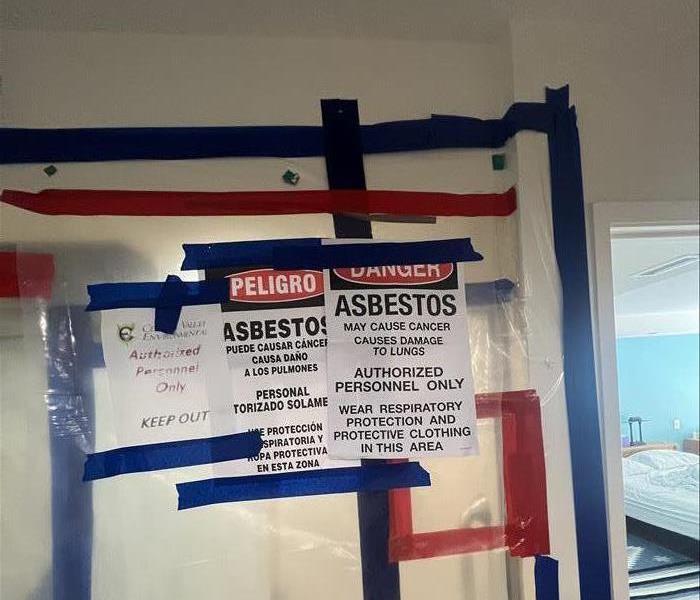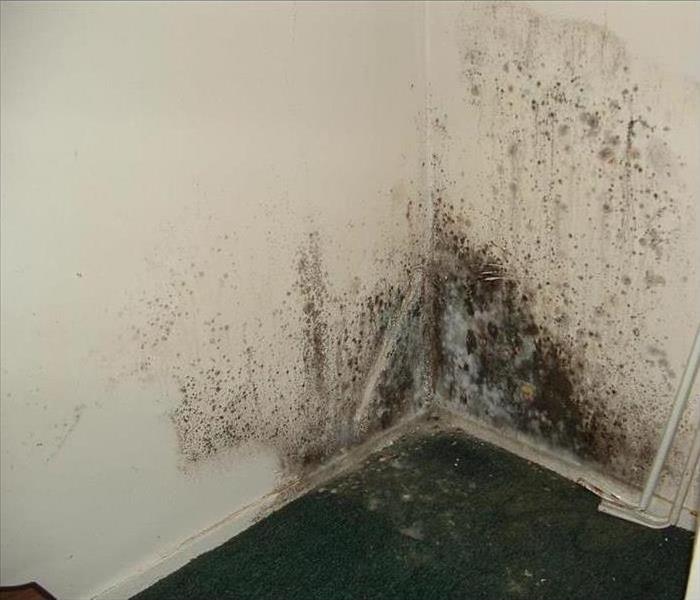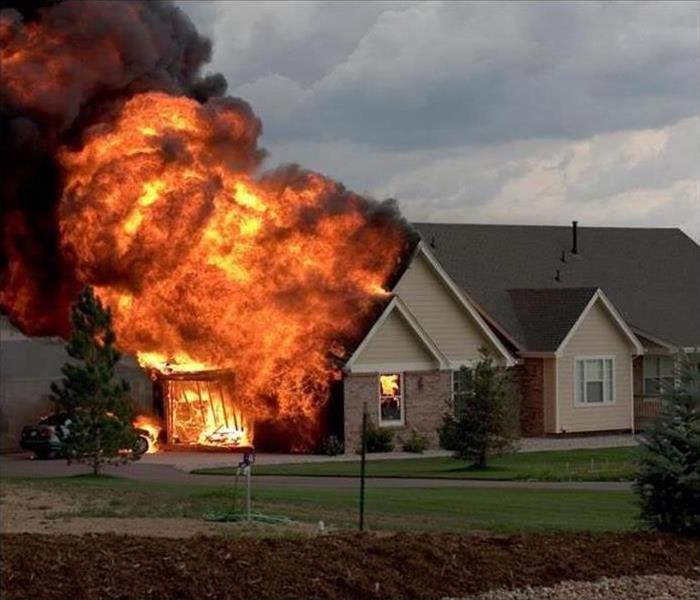Recent Posts
Ho, ho, oh no!
2/4/2025 (Permalink)
 A pinhole leak in a pipe.
A pinhole leak in a pipe.
The holidays are a joyous time for family, friends, and coworkers alike. By mode of planes, trains, and automobiles, everyone collectively sees this time of year as the perfect opportunity to reconnect with those they care about most. But what happens when you do finally decide to take that plane across the country to visit with your nana . . . and a pinhole leak from a main pipe starts in your wall back home while you’re away? Wintertime poses a particular risk of burst pipes, as the colder temperatures can often exacerbate plumbing systems. So, it’s important to have someone you trust, whether they are a friend, family member, or neighbor, to check in on your abode while you’re away. If left unchecked, even the smallest of leaks can lead to mold spores that infiltrate your drywall and flooring. That being said, don’t fret! Because even in the event that you return home from your nana’s only to discover a wet, musty mess, we here at SERVPRO® will take care of everything, keeping your spirits merry and bright!
Ho, ho, oh no!
12/18/2024 (Permalink)
 A pinhole leak in a pipe.
A pinhole leak in a pipe.
The holidays are a joyous time for family, friends, and coworkers alike. By mode of planes, trains, and automobiles, everyone collectively sees this time of year as the perfect opportunity to reconnect with those they care about most. But what happens when you do finally decide to take that plane across the country to visit with your nana . . . and a pinhole leak from a main pipe starts in your wall back home while you’re away? Wintertime poses a particular risk of burst pipes, as the colder temperatures can often exacerbate plumbing systems. So, it’s important to have someone you trust, whether they are a friend, family member, or neighbor, to check in on your abode while you’re away. If left unchecked, even the smallest of leaks can lead to mold spores that infiltrate your drywall and flooring. That being said, don’t fret! Because even in the event that you return home from your nana’s only to discover a wet, musty mess, we here at SERVPRO® will take care of everything, keeping your spirits merry and bright!
Before You Pull Out Those Wreaths . . .
12/18/2024 (Permalink)
 Mold spores on a picture frame.
Mold spores on a picture frame.
Ah, yes, it’s that same time of year where we venture up into the spooky, musty attic to gather our ornaments of cheer! But wait a minute . . . what is that smell? You open up your first storage box of holiday decorations, and a wave of mildew smell permeates the air around you. There are many factors that lead to mold growth on contents, the primary one being stagnant moisture in the wreaths that hang outside on your front door. While you may be mentally, socially, and physically exhausted after the family leaves and all the holiday dinner dishes are washed, it’s important not to be hasty when putting your decorations back in their storage containers, as these containers are typically airtight, leaving no room for circulation. Did you do all that and still ended up with your favorite mistletoe picture frame having those nasty moldy spots? Bring your contents to SERVPRO®, where we can work our magic in helping restore them to their former glory!
Holiday Fire Tips!
12/18/2024 (Permalink)
 Tree beside fire extinguisher caught fire.
Tree beside fire extinguisher caught fire.
We all love the holidays for so many reasons, but the main one has to be the excuse in having a big ol’ tree smack-dab in the middle of your living room! With the dazzling lights and priceless family ornaments that adorn it, a Christmas tree alone has the capacity to cheer even the most stubborn of all scrooges. However, while having such a spectacular display in the comfort of your own home can be magical, it can just as well pose a great fire hazard. So, here are some tips on maintaining a fire-free environment during the holidays!
- Test and update your smoke detectors yearly.
- Inspect holiday lights (especially old ones) and throw away any with frayed or pinched wires.
- If you have a real tree, make sure to keep it watered regularly.
- Always douse any fires in your fireplace before retiring for the evening.
Asbestos . . . Asbestos?
9/7/2023 (Permalink)
 Asbestos containment in bathroom
Asbestos containment in bathroom
In 1977 asbestos was banned from being used in any building material. So no home should have any traces of it, right? Unfortunately not. If your abode was built before 1977, there may still be harmful asbestos lurking behind your walls and ceilings. Side effects of asbestos inhalation include, but are not limited to, wheezing, weight loss, crackly sounds in the lungs, and chest pain. If any form of demo or home improvement is done to a home riddled with asbestos, even one-time exposure is enough to cause the above health effects. The picture shown is a containment of asbestos that was discovered in the ceiling of a shower in a building that was built back in 1973. And while other units may have been asbestos-free, the homeowner of this unit was surprised to discover the toxicity living rent-free behind his own walls. This is why hiring professionals like SERVPRO® to repair your home is so crucial. Otherwise, life-altering complications could arise.
Big or Small, It's All The Same
8/31/2023 (Permalink)
Picture this: You start filling your tub to prepare for a nice, relaxing bath when your mother-in-law calls you to express her worries over what to make for the potluck that's not happening for over a month. Wanting to alleviate her misplaced worry, you tell her that you'll look up some recipes for her on Pinterest and will get back to her. But before you're able to get off the phone, she starts asking about the weather where you are, your job, and the like. By the time you are finally able to considerately get off the phone, forty-five minutes have gone by . . . and now your tub water has overflowed onto the hardwood floor. What do you do? Do you A: Pile on all the towels you own and place a couple household fans in the hopes you handle it? Or, B: Call SERVPRO and have a team of professionals monitor the situation to ultimately meet IICRC standards? If you picked A, here is something to remember: Big or small, every water loss is different. And without the proper equipment and experience, something that started off small could become a huge headache in the future.
Mold Check
8/30/2023 (Permalink)
 Mold discovered in the ceiling above homeowner's shower
Mold discovered in the ceiling above homeowner's shower
Is your home mold-free? If you're unable to answer this question quickly, you should immediately check under sinks, around your dishwasher, showers, and anywhere that is prone to moisture. And if any of these areas look similar to the provided image of one of our most recent jobs, we urge you to call SERVPRO® today. The image presented is a piece of sheetrock that was fixed above the homeowner's shower. Yikes, right? Luckily with our help, the issue has since been remedied and we are currently in the process of rebuilding her abode to safety standards. Symptoms of mold exposure can manifest similar to those of the common cold or flu, so it is quite easy to overlook. Especially if there are no immediate signs present, such as musty smell, discoloration, or staining. Your home should be your nest, which implies comfort and safety in all aspects. So, if you are ever unsure for any reason, don't hesitate to call SERVPRO for a site inspection.
Prevent Home Fires
7/9/2021 (Permalink)
Fire is FAST! In less than 30 seconds a small flame can turn into a major fire. It only takes minutes for thick black smoke to fill a house or for it to be engulfed in flames.
Fire is HOT! Heat is more threatening than flames. Room temperatures in a fire can be 100 degrees at floor level and rise to 600 degrees at eye level. Inhaling this super-hot air will scorch your lungs and melt clothes to your skin.
Fire is DARK! Fire starts bright, but quickly produces black smoke and complete darkness.
Fire is DEADLY! Smoke and toxic gases kill more people than flames do. Fire produces poisonous gases that make you disoriented and drowsy. Asphyxiation is the leading cause of fire deaths, exceeding burns by a three-to-one ratio.
Home fires are preventable! The following are simple steps that each of us can take to prevent a tragedy.
Cooking
- Stay in the kitchen when you are frying, grilling, or broiling food. If you leave the kitchen for even a short period of time, turn off the stove.
- Wear short, close-fitting or tightly rolled sleeves when cooking.
- Keep children away from cooking areas by enforcing a "kid-free zone" of 3 feet around the stove.
- Position barbecue grills at least 10 feet away from siding and deck railings, and out from under eaves and overhanging branches.
Smoking
- Smoke outside and completely stub out butts in an ashtray or a can filled with sand.
- Soak cigarette butts and ashes in water before throwing them away. Never toss hot cigarette butts or ashes in the trash can.
- Never smoke in a home where oxygen is used, even if it is turned off. Oxygen can be explosive and makes fire burn hotter and faster.
- Be alert - don’t smoke in bed! If you are sleepy, have been drinking, or have taken medicine that makes you drowsy, put your cigarette out first.
Electrical and Appliance Safety
- Frayed wires can cause fires. Replace all worn, old or damaged appliance cords immediately and do not run cords under rugs or furniture.
- If an appliance has a three-prong plug, use it only in a three-slot outlet. Never force it to fit into a two-slot outlet or extension cord.
- Immediately shut off, then professionally replace, light switches that are hot to the touch and lights that flicker.
Portable Space Heaters
- Keep combustible objects at least three feet away from portable heating devices.
- Buy only heaters evaluated by a nationally recognized laboratory, such as Underwriters Laboratories (UL).
- Check to make the portable heater has a thermostat control mechanism, and will switch off automatically if the heater falls over.
- Only use crystal clear K-1 kerosene in kerosene heaters. Never overfill it. Use the heater in a well-ventilated room.
Fireplaces and Woodstoves
- Inspect and clean woodstove pipes and chimneys annually and check monthly for damage or obstructions.
- Use a fireplace screen heavy enough to stop rolling logs and big enough to cover the entire opening of the fireplace to catch flying sparks.
- Make sure the fire is completely out before leaving the house or going to bed.
Children
- Take the mystery out of fire play by teaching children that fire is a tool, not a toy.
- Store matches and lighters out of children's reach and sight, preferably in a locked cabinet.
- Never leave children unattended near operating stoves or burning candles, even for a short time.
More Prevention Tips
- Never use stove range or oven to heat your home.
- Keep combustible and flammable liquids away from heat sources.
- Portable generators should NEVER be used indoors and should only be refueled outdoors or in well ventilated areas.
For more information on fire information and prevention, please visit - https://www.ready.gov/home-fires
Understanding Mold
7/9/2021 (Permalink)
 Solve moisture problems before they become mold problems!
Solve moisture problems before they become mold problems!
In as little as 48 hours, mold can quickly become a problem in your home or business when there’s a water intrusion, like a roof leak or leaking water line. Mold can cause health effects and can also cause significant damage to your property. SERVPRO Franchise Professionals have the training, protective gear, and specialized equipment necessary to handle your mold problem.
Mold Prevention Tips
- Fix leaky plumbing and leaks in the building envelope as soon as possible.
- Watch for condensation and wet spots. Fix sources of moisture problems as soon as possible.
- Prevent moisture due to condensation by increasing surface temperature or reducing the moisture level in air (humidity). To increase surface temperature, insulate or increase air circulation. To reduce the moisture level in the air, repair leaks, increase ventilation (if outside air is cold and dry), or dehumidify (if outdoor air is warm and humid).
- Keep heating, ventilation, and air conditioning (HVAC) drip pans clean, flowing properly, and unobstructed.
- Vent moisture-generating appliances, such as dryers or showers to the outside where possible.
- Maintain low indoor humidity, below 60% relative humidity (RH), ideally 30-50%, if possible by providing adequate ventilation.
- Perform regular building/HVAC inspections and maintenance as scheduled.
- Clean and dry wet or damp spots within 48 hours.
- Don’t let foundations stay wet. Provide drainage and slope the ground away from the foundation.
- Use exhaust fans whenever cooking, dishwashing, and cleaning in food service areas.
- Inspect the building for signs of mold, moisture, leaks or spills:
- Check for moldy odors.
- Look for water stains or discoloration on the ceiling, walls, floors and window sills.
- Look around and under sinks for standing water, water stains or mold.
- Inspect bathrooms for standing water, water stains or mold.
- Do not let water stand in air conditioning or refrigerator drip pans.
- Clean mold off hard surfaces with water and detergent, and dry completely.
- Absorbent materials such as ceiling tiles, that are moldy, may need to be replaced.
- Check the mechanical room and roof for unsanitary conditions, leaks or spills. v Reduce the potential for condensation on cold surfaces (i.e., windows, piping, exterior walls, roof, or floors) by adding insulation.
Fourth of July Safety Tips
7/2/2021 (Permalink)
It’s that time again for 4th of July celebrations! Whatever you have planned; whether its just fireworks, a backyard barbecue, or maybe a quick trip to the beach, SERVPRO wants to make sure you take all safety precautions this holiday!
FIREWORKS SAFETY The safest way to enjoy fireworks is to attend a public fireworks show put on by professionals, while maintaining a safe distance. While the majority of the states prohibit most fireworks- If you, or someone you know is setting fireworks off at home, follow these safety steps:
- Never give fireworks to small children, and abide by the directions on the packaging.
- Keep a supply of water close by as a preventative measure.
- Make sure the person lighting fireworks always wears eye protection.
- Never toss or point a firework in the direction of people, animals, vehicles, structures or flammable materials.
GRILLING SAFETY Every year people in this country are injured while using backyard charcoal or gas grills. Follow these safety tips to carefully grill up treats for the backyard barbecue:
- Always supervise a barbecue grill when in use.
- Never grill indoors
- Make sure everyone (including the pets) stays away from the grill.
- Keep the grill out in the open, and away from anything that could potentially catch on fire.
- Never add charcoal starter fluid when coals have already been ignited.
- Always follow the manufacturer’s instructions when using grills.
BEACH SAFETY If someone’s visit to the shore includes swimming in the ocean, they should make sure they know how to swim, and stay by a lifeguard station.Obey all instructions and orders from lifeguards. Rip currents are responsible for deaths on our nation’s beaches every year, and for most of the rescues performed by lifeguards. Any beach with breaking waves may have rip currents. Be aware of the danger of rip currents and remember the following:
- Keep alert for local weather conditions. Check to see if any warning signs or flags are posted.
- Swim sober and always swim with a buddy.
- Have young children and inexperienced swimmers wear a Coast Guard-approved life jacket.
- Keep a close eye and constant attention on children and adults while at the beach. Wave action can cause someone to lose his or her footing, even in shallow water.
- If someone is caught in a rip current, swim parallel to the shore until out of the current. Once free, they should turn and swim toward shore. If they can't swim to the shore, they should float or tread water until free of the rip current and then head toward shore.
- Stay at least 100 feet away from piers and jetties. Permanent rip currents often exist near these structures.
SUN PROTECTION Limit exposure to direct sunlight between 10 a.m. and 4 p.m., during the peak heat hours of the day. Wear a broad-spectrum sunscreen with a protection factor of at least 15, and reapply sunscreen as often as needed. Remember to drink plenty of water regularly, even if not thirsty. Minimize drinks with alcohol or caffeine in them. Protect the eyes by wearing sunglasses that will absorb 100 percent of UV sunlight. During hot weather, watch for signs of heat stroke—hot, red skin; changes in consciousness; rapid, weak pulse; rapid, shallow breathing. If it’s suspected someone is suffering from heat stroke immediately call 9-1-1 and move the person to a cooler place.




 24/7 Emergency Service
24/7 Emergency Service








